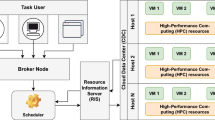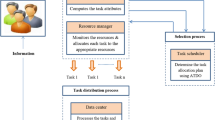Abstract
In cloud computing, task scheduling plays a major role and the efficient schedule of tasks can increase the cloud system efficiency. To successfully meet the dynamic requirements of end-users’ applications, advanced scheduling techniques should be in place to ensure optimal mapping of tasks to cloud resources. In this paper, a modified Henry gas solubility optimization (HGSO) is presented which is based on the whale optimization algorithm (WOA) and a comprehensive opposition-based learning (COBL) for optimum task scheduling. The proposed method is named HGSWC. In the proposed HGSWC, WOA is utilized as a local search procedure in order to improve the quality of solutions, whereas COBL is employed to improve the worst solutions by computing their opposite solutions and then selecting the best among them. HGSWC is validated on a set of thirty-six optimization benchmark functions, and it is contrasted with conventional HGSO and WOA. The proposed HGSWC has been proved to perform better than the comparison algorithms. Moreover, the performance of HGSWC has also been tested on a set of synthetic and real workloads including fifteen different task scheduling problems. The results obtained through simulation experiments demonstrate that HGSWC finds near optimal solutions with no computational overhead as well as outperforms six well-known metaheuristic algorithms.










Similar content being viewed by others
Explore related subjects
Discover the latest articles, news and stories from top researchers in related subjects.References
Abd El Aziz M, Ewees AA, Hassanien AE (2017) Whale optimization algorithm and moth-flame optimization for multilevel thresholding image segmentation. Expert Syst Appl 83:242–256
Abd El Aziz M, Ewees AA, Hassanien AE (2018a) Multi-objective whale optimization algorithm for content-based image retrieval. Multimed Tools Appl 77(19):26135–26172
Abd El Aziz M, Ewees AA, Hassanien AE, Mudhsh M, Xiong S (2018b) Multi-objective whale optimization algorithm for multilevel thresholding segmentation. In: Advances in soft computing and machine learning in image processing. Springer, Berlin, pp 23–39
Abd Elaziz M, Oliva D (2018) Parameter estimation of solar cells diode models by an improved opposition-based whale optimization algorithm. Energy Convers Manag 171:1843–1859
Abd Elaziz M, Oliva D, Xiong S (2017) An improved opposition-based sine cosine algorithm for global optimization. Expert Syst Appl 90:484–500
Abd Elaziz M, Ewees AA, Ibrahim RA, Lu S (2020) Opposition-based moth-flame optimization improved by differential evolution for feature selection. Math Comput Simul 168:48–75
Abdel-Basset M, Abdle-Fatah L, Sangaiah AK (2018) An improved Lévy based whale optimization algorithm for bandwidth-efficient virtual machine placement in cloud computing environment. Cluster Comput 22:1–16
Abdullahi M, Ngadi MA (2016) Hybrid symbiotic organisms search optimization algorithm for scheduling of tasks on cloud computing environment. PLoS ONE 11(6):e0158229
Abdullahi M, Ngadi MA et al (2016) Symbiotic organism search optimization based task scheduling in cloud computing environment. Future Gener Comput Syst 56:640–650
Abdullahi M, Ngadi MA, Dishing SI, Ahmad BI et al (2019) An efficient symbiotic organisms search algorithm with chaotic optimization strategy for multi-objective task scheduling problems in cloud computing environment. J Netw Comput Appl 133:60–74
Akbari M, Rashidi H (2016) A multi-objectives scheduling algorithm based on cuckoo optimization for task allocation problem at compile time in heterogeneous systems. Expert Syst Appl 60:234–248
Akbari M, Rashidi H, Alizadeh SH (2017) An enhanced genetic algorithm with new operators for task scheduling in heterogeneous computing systems. Eng Appl Artif Intell 61:35–46
Alla HB, Alla SB, Touhafi A, Ezzati A (2018) A novel task scheduling approach based on dynamic queues and hybrid meta-heuristic algorithms for cloud computing environment. Cluster Comput 21(4):1797–1820
Ari AAA, Damakoa I, Titouna C, Labraoui N, Gueroui A (2017) Efficient and scalable ACO-based task scheduling for green cloud computing environment. In: IEEE International conference on smart cloud, pp 66–71
Arunarani AR, Manjula D, Sugumaran V (2019) Task scheduling techniques in cloud computing: a literature survey. Future Gener Comput Syst 91:407–415
Attiya I, Zhang X (2017) D-choices scheduling: a randomized load balancing algorithm for scheduling in the cloud. J Comput Theor Nanosci 14(9):4183–4190
Attiya I, Elaziz Abd M, Xiong S (2020) Job scheduling in cloud computing using a modified Harris Hawks optimization and simulated annealing algorithm. Comput Intell Neurosci 2020:3504642
Beegom ASA, Rajasree MS (2019) Integer-PSO: a discrete PSO algorithm for task scheduling in cloud computing systems. Evolut Intell 12(2):227–239
Bittencourt LF, Madeira ERM, Da Fonseca NLS (2012) Scheduling in hybrid clouds. IEEE Commun Mag 50(9):42–47
Burnwal S, Deb S (2013) Scheduling optimization of flexible manufacturing system using cuckoo search-based approach. Int J Adv Manuf Technol 64(5–8):951–959
Buyya R, Yeo CS, Venugopal S, Broberg J, Brandic I (2009) Cloud computing and emerging it platforms: vision, hype, and reality for delivering computing as the 5th utility. Future Gener Comput Syst 25(6):599–616
Calheiros RN, Ranjan R, Beloglazov A, De Rose César AF, Buyya R (2011) Cloudsim: a toolkit for modeling and simulation of cloud computing environments and evaluation of resource provisioning algorithms. Softw Pract Exp 41(1):23–50
Ding L, Fan P, Wen B (2014) A task scheduling algorithm for heterogeneous systems using ACO. In: International symposium on instrumentation and measurement, sensor network and automation, pp 749–751
Ewees AA, Abd Elaziz M, Oliva D (2018a) Image segmentation via multilevel thresholding using hybrid optimization algorithms. J Electron Imaging 27(6):063008
Ewees AA, Abd Elaziz M, Houssein EH (2018b) Improved grasshopper optimization algorithm using opposition-based learning. Expert Syst Appl 112:156–172
Gharehchopogh FS, Gholizadeh H (2019) A comprehensive survey: whale optimization algorithm and its applications. Swarm Evolut Comput 48:1–24
Guo L, Zhao S, Shen S, Jiang C (2012) Task scheduling optimization in cloud computing based on heuristic algorithm. J Netw 7(3):547–553
Hashim FA, Houssein EH, Mabrouk MS, Al-Atabany W, Mirjalili S (2019) Henry gas solubility optimization: a novel physics-based algorithm. Future Gener Comput Syst 101:646–667
Hashim FA, Houssein EH, Hussain K, Mabrouk MS, Al-Atabany W (2020) A modified Henry gas solubility optimization for solving motif discovery problem. Neural Comput Appl 32(14):10759–10771
Houssein EH, Saad MR, Hashim FA, Shaban H, Hassaballah M (2020) Lévy flight distribution: a new metaheuristic algorithm for solving engineering optimization problems. Eng Appl Artif Intell 94:103731
Jia Z, Yan J, Leung JYT, Li K, Chen H (2019) Ant colony optimization algorithm for scheduling jobs with fuzzy processing time on parallel batch machines with different capacities. Appl Soft Comput 75:548–561
Kennedy J, Eberhart R (1995) Particle swarm optimization. In: Proceedings of ICNN’95—international conference on neural networks, November, vol 4, pp 1942–1948
Keshanchi B, Souri A, Navimipour NJ (2017) An improved genetic algorithm for task scheduling in the cloud environments using the priority queues: formal verification, simulation, and statistical testing. J Syst Softw 124(February):1–21
Khalili A, Babamir SM (2015) Makespan improvement of PSO-based dynamic scheduling in cloud environment. In: 2015 23rd Iranian conference on electrical engineering. IEEE, pp 613–618
Khan AA, Zakarya M, Khan R, Rahman IU, Khan M, Khan AUR (2020) An energy, performance efficient resource consolidation scheme for heterogeneous cloud datacenters. J Netw Comput Appl 150:102497
Kim S-S, Byeon J-H, Yu H, Liu H (2014) Biogeography-based optimization for optimal job scheduling in cloud computing. Appl Math Comput 247:266–280
Kumar M, Sharma SC, Goel A, Singh SP (2019) A comprehensive survey for scheduling techniques in cloud computing. J Netw Comput Appl 143:1–33
Li C, Tang J, Ma T, Yang X, Luo Y (2020) Load balance based workflow job scheduling algorithm in distributed cloud. J Netw Comput Appl 152:102518
Mafarja MM, Mirjalili S (2017) Hybrid whale optimization algorithm with simulated annealing for feature selection. Neurocomputing 260:302–312
Mansouri N, Zade BMH, Javidi MM (2019) Hybrid task scheduling strategy for cloud computing by modified particle swarm optimization and fuzzy theory. Comput Ind Eng 130:597–633
Mell P, Grance T (2011) The NIST definition of cloud computing. Technical report
Mirjalili S (2015) Moth-flame optimization algorithm: a novel nature-inspired heuristic paradigm. Knowl Based Syst 89:228–249
Mirjalili S, Lewis A (2016) The whale optimization algorithm. Adv Eng Softw 95:51–67
Mirjalili S, Gandomi AH, Mirjalili SZ, Saremi S, Faris H, Mirjalili SM (2017) Salp swarm algorithm: a bio-inspired optimizer for engineering design problems. Adv Eng Softw 114:163–191
Navimipour NJ, Milani FS (2015) Task scheduling in the cloud computing based on the cuckoo search algorithm. Int J Model Optim 5(1):44–47
Neggaz N, Houssein EH, Hussain K (2020) An efficient Henry gas solubility optimization for feature selection. Expert Syst Appl 152:113364
Oliva D, Abd El Aziz M, Hassanien AE (2017) Parameter estimation of photovoltaic cells using an improved chaotic whale optimization algorithm. Appl Energy 200:141–154
Pandey S, Wu L, Guru SM, Buyya R (2010) A particle swarm optimization-based heuristic for scheduling workflow applications in cloud computing environments. In: 2010 24th IEEE International conference on advanced information networking and applications. IEEE, pp 400–407
Rekha PM, Dakshayini M (2019) Efficient task allocation approach using genetic algorithm for cloud environment. Cluster Comput 22:1–11
Rodriguez MA, Buyya R (2014) Deadline based resource provisioning and scheduling algorithm for scientific workflows on clouds. IEEE Trans Cloud Comput 2(2):222–235
Saranya S, Saravanan B (2020) Effect of emission in SMEs based unit commitment using modified Henry gas solubility optimization. J Energy Storage 29:101380
Seif Z, Ahmadi MB (2015) An opposition-based algorithm for function optimization. Eng Appl Artif Intell 37:293–306
Sharma M, Garg R (2017) Energy-aware whale-optmized task scheduler in cloud computing. In: 2017 International conference on intelligent sustainable systems (ICISS), December, pp 121–126
Sreenu K, Sreelatha M (2019) W-scheduler: whale optimization for task scheduling in cloud computing. Cluster Comput 22(1):1087–1098
Suganthan PN, Hansen N, Liang JJ, Deb K, Chen Y-P, Auger A, Tiwari S (2005) Problem definitions and evaluation criteria for the cec 2005 special session on real-parameter optimization. KanGAL Rep 2005005:2005
Tharwat A, Houssein EH, Ahmed MM, Hassanien AE, Gabel T (2018) Mogoa algorithm for constrained and unconstrained multi-objective optimization problems. Appl Intell 48(8):2268–2283
Tizhoosh HR (2005) Opposition-based learning: a new scheme for machine intelligence. In: International conference on computational intelligence for modelling, control and automation and international conference on intelligent agents, web technologies and internet commerce, vol 1, pp 695–701
Wang J, Du P, Niu T, Yang W (2017) A novel hybrid system based on a new proposed algorithm–multi-objective whale optimization algorithm for wind speed forecasting. Appl Energy 208:344–360
Xu J, Lam AYS, Li VOK (2011) Chemical reaction optimization for task scheduling in grid computing. IEEE Trans Parallel Distrib Syst 22(10):1624–1631
Yang X-S (2009) Firefly algorithms for multimodal optimization. In: Watanabe O, Zeugmann T (eds) Stochastic algorithms: foundations and applications. Springer, Berlin, pp 169–178
Zhang Q, Cheng L, Boutaba R (2010) Cloud computing: state-of-the-art and research challenges. J Internet Serv Appl 1(1):7–18
Zhao C, Zhang S, Liu Q, Xie J, Hu J (2009) Independent tasks scheduling based on genetic algorithm in cloud computing. In: 2009 5th International conference on wireless communications, networking and mobile computing, september, pp 1–4
Zhou Z, Li F, Zhu H, Xie H, Abawajy JH, Chowdhury MU (2019) An improved genetic algorithm using greedy strategy toward task scheduling optimization in cloud environments. Neural Comput Appl 32:1531–1541
Acknowledgements
This work is supported by the Hubei Provincial Science and Technology Major Project of China under Grant No. 2020AEA011. The China Postdoctoral Science Foundation under Grant No. 2019M652647.
Author information
Authors and Affiliations
Corresponding author
Additional information
Publisher's Note
Springer Nature remains neutral with regard to jurisdictional claims in published maps and institutional affiliations.
Rights and permissions
About this article
Cite this article
Abd Elaziz, M., Attiya, I. An improved Henry gas solubility optimization algorithm for task scheduling in cloud computing. Artif Intell Rev 54, 3599–3637 (2021). https://doi.org/10.1007/s10462-020-09933-3
Published:
Issue Date:
DOI: https://doi.org/10.1007/s10462-020-09933-3




